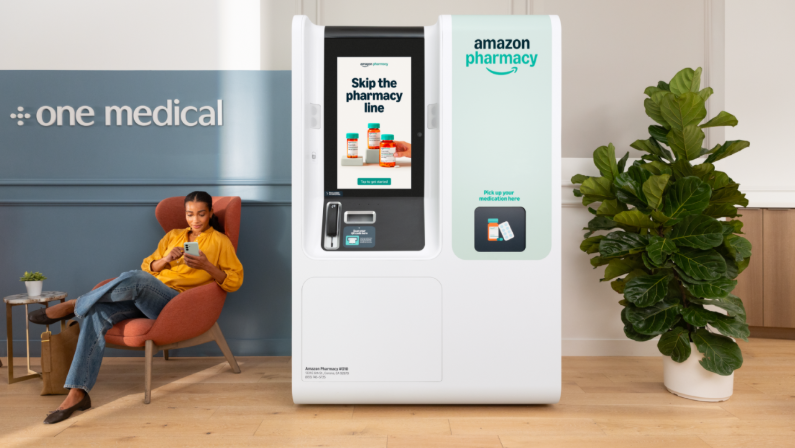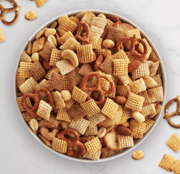
You just finished a doctor's appointment, got your prescription, and now face the familiar dilemma: another trip to the pharmacy, another wait in line, another hassle when you're already tired from your medical visit.
Amazon thinks it has a solution that could change all that. The retail giant is launching prescription drug vending machines at One Medical locations, starting this December. But this isn't just about convenience—it's potentially a lifeline for seniors facing real barriers to getting their medications.
"By bringing the pharmacy directly to the point of care, we're removing a critical barrier and helping patients start their treatment when it matters most-right away."
Why this matters for older Americans
The numbers tell a sobering story about prescription access in America. According to recent CDC data, 88.6% of older adults took prescription medications in the previous 12 months. But getting those medications isn't always straightforward.
Even more concerning, nearly a quarter of adults age 65-plus report difficulty affording their prescription drugs, and 48% of adults age 50 and older have either skipped filling a prescription due to costs or know someone who has.
The logistics of getting prescriptions filled create another layer of challenge. Many seniors face mobility issues, transportation limitations, or simply the exhaustion of managing multiple medical appointments. When you add a separate pharmacy trip to an already demanding healthcare routine, it's no wonder some prescriptions never get filled.
How Amazon's kiosks will work
Starting in December, patients at participating One Medical locations in downtown Los Angeles, West LA, Beverly Hills, Long Beach, and West Hollywood will be able to pick up prescriptions immediately after their appointments. The kiosks will stock hundreds of commonly prescribed medications including antibiotics, inhalers, blood pressure treatments, and seasonal medications like flu and allergy drugs.
The process appears straightforward:
- Create an Amazon Pharmacy account
- Schedule your One Medical appointment
- Ask your provider to send prescriptions to Amazon Pharmacy
- Scan a QR code from the Amazon app to retrieve medications "within minutes"
For Medicare recipients, this integration could be particularly valuable. One Medical does accept health plans from most insurance carriers as well as Medicare, including Original Medicare, supplemental Medicare plans, and some Medicare Advantage plans.
Also read: What Pfizer’s new deal could mean for prescription drug costs in America
The Medicare connection makes this relevant
Amazon's timing isn't accidental. The company completed its $3.9 billion acquisition of One Medical in February 2023, gaining access to a primary care network that specifically serves seniors on Medicare. One Medical has been expanding its services for older adults, recognizing that this population often needs more comprehensive care coordination.
Consider this: 83.6% of adults aged 60-79 used prescription drugs compared with 59.5% of those aged 40-59, and 34.5% of adults aged 60-79 used five or more prescription drugs versus 14.5% of those aged 40-59. This higher medication burden makes the convenience of immediate pickup especially appealing.
Medicare and Amazon One Medical
Amazon One Medical accepts Medicare plans, including:
• Original Medicare (Parts A & B)
• Many supplemental Medicare plans
• Select Medicare Advantage plans
• Both in-person visits and some virtual care options are covered
Check with One Medical directly to confirm your specific plan is accepted at your preferred location.
A response to pharmacy chain struggles
This move comes as traditional pharmacy chains face significant challenges. Major chains like CVS and Walgreens have been closing locations and reducing hours, making prescription access more difficult for many communities.
For seniors who may have relied on the same neighborhood pharmacy for years, these closures can be particularly disruptive. Building relationships with new pharmacists, learning new locations, and adapting to different systems all add stress to an already complex healthcare routine.
Addressing privacy and security concerns
Older adults often express legitimate concerns about automated systems handling sensitive health information. Amazon and One Medical emphasize that HIPAA protections remain in full effect, and the same privacy standards that apply to traditional pharmacies apply to these kiosks.
The technology appears designed with user-friendliness in mind. The QR code system through the Amazon app eliminates the need to remember PINs or navigate complex interfaces, and patients can still speak with healthcare providers if they have questions about their medications.
Also read: Promising chemical discovery offers hope for cheaper prescriptions
What this means for your healthcare routine
For seniors managing multiple prescriptions and frequent medical appointments, these kiosks could eliminate several pain points:
- No more coordinating separate pharmacy trips
- No more waiting in line when you're already tired from a medical visit
- No more worrying about pharmacy hours or closures
The system also creates better coordination between your primary care visit and your medication management. Your One Medical provider can send prescriptions directly to the kiosk, potentially catching drug interactions or dosing issues more quickly.
Who benefits most from pharmacy kiosks
- Seniors with mobility or transportation challenges
- Patients managing multiple prescriptions requiring frequent refills
- Medicare recipients seeking more integrated healthcare services
- People who want to avoid separate pharmacy trips after medical appointments
- Patients in areas where traditional pharmacies have closed or reduced hours
Also read: Missing these Medicare deadlines could drain your wallet—here’s how to stay on track
Looking ahead
Amazon plans to expand these kiosks to additional One Medical locations throughout 2026, with a spokesperson noting the potential for "extending to other environments—anywhere quick access to medication can make a difference."
This could signal a broader shift in how Americans access prescription medications, particularly as healthcare becomes more integrated and technology-driven. For seniors, who often face the most complex medication regimens and the greatest barriers to pharmacy access, innovations like this could genuinely improve health outcomes.
The success of Amazon's pharmacy kiosks will likely depend on how well they serve real patient needs rather than just technological novelty. For older adults especially, convenience matters—but so do personal service, clear communication, and trustworthy healthcare relationships.
Read next:
- 6 smart ways to slash your prescription costs that pharmacists rarely mention
- Major cholesterol drug gets huge price cut, saving Americans hundreds each month
- Could SeniorCare help cut your prescription costs? Some seniors in this state are finding out
What's your take on getting prescriptions through vending machines? Would this kind of convenience be helpful for managing your medications, or do you prefer the personal touch of traditional pharmacies?






